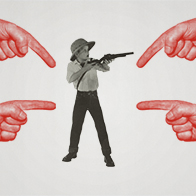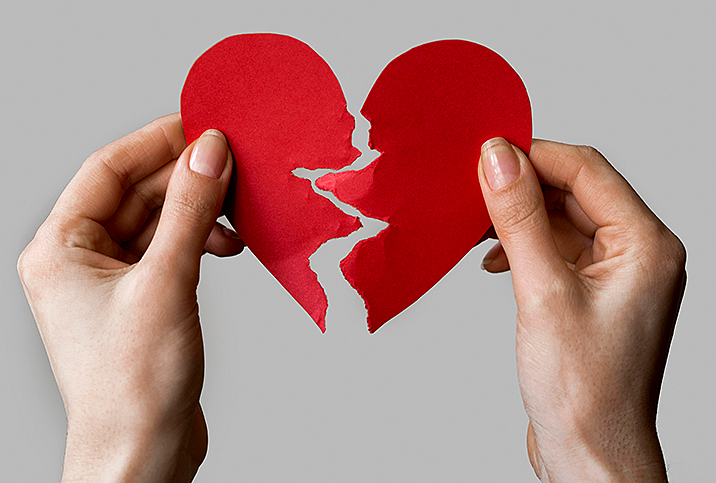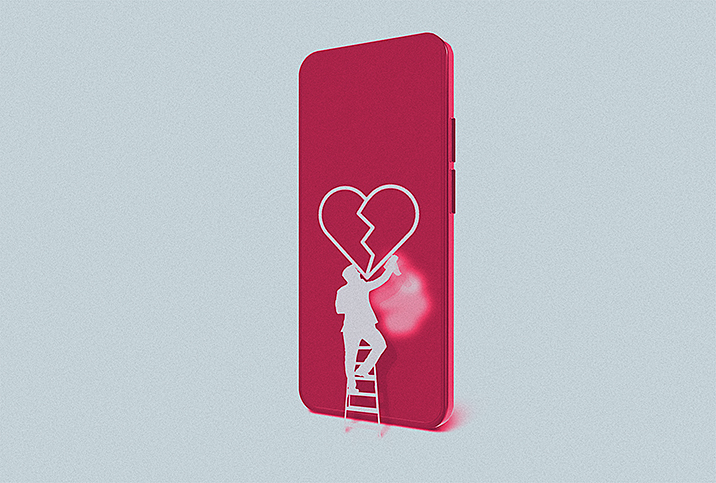For Men, Breakups Are Hard

As Neil Sedaka famously sang, "Breaking up is hard to do," and there's reason to believe it might be especially hard for men.
Research suggests men are more likely than women to develop suicidality during marital separation: The risk of suicide is four times higher for men than women during separation.
"There's an old saying that women grieve and men replace," said Alexandra Katehakis, Ph.D., a marriage and family therapist and clinical director of the Center for Healthy Sex in Los Angeles. "Women will commonly allot time to grieve the loss of a relationship and process the residual pain. They won't return to dating as quickly as men are wont to do following a breakup, in the aftermath of a divorce or even after becoming widowed."
Katehakis, who authored the 2010 book, "Erotic Intelligence: Igniting Hot, Healthy Sex While in Recovery from Sex Addiction," partly attributes those tendencies among men to a form of, or a phenomenon akin to, male vulnerability, which can set guys up to be less capable of dealing with the end of romantic partnerships.
A variety of barriers can keep men from seeking support and otherwise getting through a breakup without excessive distress.
Masculinity and internalization of 'Man Rules'
"So when we think about masculinity, that's a concept with multiple definitions," Katehakis clarified. As a gender expression, it could be conceived and expressed in neutral or healthy forms, but those don't always predominate.
Some men grow up with and remain attached to a rather rigid, traditional model of manhood, said Dan Griffin, author of "A Man's Way Through Relationships: Learning to Love and Be Loved" and a Los Angeles-based public speaker whose work focuses on men's relationships and masculinity.
"Those guys are going to have tougher times in relationships these days because the expectations for relationships have changed," he said.
Griffin popularized a term for the kind of gendered conditioning that shapes many males. What he calls the "Man Rules" have to do with insidious, acquired assumptions about what it means to be a boy or a man. Men internalize these schemas at a young age as they wade through the sea of ideas pertaining to masculinity.
When he lectures, Griffin asks members of the audience about the rules they're familiar with and, invariably, he receives similar responses.
"Almost always, the first is, 'Don't cry,'" he said. "After that, 'Don't ask for help,' 'Don't show feelings,' 'Don't be vulnerable,' 'Don't be weak,' 'Always have the answers' and 'Use sex.'"
Griffin distills all those answers regarding the Man Rules, sex and intimacy into one framework: "It's 'have as much sex as possible, whenever possible, with as little connection as possible, with as many hot and different chicks as possible, with as big of a dick as possible,'" he said.
Like a lot of men, Griffin said he strives for "a more evolved sort of masculinity." But intimacy can ineluctably elicit old attitudes and habits for many guys, himself sometimes included.
"You put me in a really intimate, vulnerable situation, [and] it's amazing how quickly I can revert back to some of those Man Rules," he said.
Those conceptions of ideal masculinity do not always align with relationship expectations.
"We expect them to share feelings," Griffin said about what partners typically want from men in healthy relationships. "We expect them to ask for help. We expect them to find a way to connect other than sex. We expect them to not necessarily be weak per se, but to allow themselves to not have to always be strong, to always be rigid, [and] to express feelings other than anger."
Those expectations are diametrically opposed to the Man Rules, which means many men enter relationships with a "cognitive dissonance" and sometimes shame and trauma, he said. This can all get triggered when they're asked to do emotional work that's opposite of what they've done in the past or otherwise in conflict with the identity they've forged.
Likewise, some women internalize the same dominant ideas about masculinity, which can produce a "push-pull sort of experience" for them, Griffin added. Men have talked to him about current or previous partners who seem to only want more vulnerable masculinity on their terms. When relationships sour as a result, it can leave men feeling confused, frustrated and unloved.
Navigating relationships and breakups under the influence of often unconscious, ingrained ideas, conflicting societal expectations and underexamined presuppositions can be a challenge.
Factors contributing to post-relationship woes
Katehakis noted our culture is permeated by intense ideas, such as "rugged individualism" and the associated opposition to requesting help, as well as the reluctance to show weakness by displaying pain. Such emphasis on self-sufficiency and control can partially account for the difficulty some men have when handling breakups.
"There's also men being colonized by this need to act tough or take risks or be attractive or look cool," she said. "So all of that kind of bears down on each individual's definition of what it means to be a man and how to handle one's life."
How someone responds when romance runs its course depends a lot on the person, from how they were raised, how they've been conditioned, the culture in which they grew up, their faith and more, she added.
A lack of support for and among men
Social norms appear to keep some men from seeking support for interpersonal issues.
Not surprisingly, many men have few sources of emotional support outside their romantic partners. Griffin said select men open up a bit about relationship woes to friends, but they tend to lack an "emotional language for how to support each other," so the conversations may involve less productive complaining about a partner or an ex. What remains common is having "somebody who co-signs your bulls--t," referring to the bro so many guys have been expected to be: The buddy who agrees with you, "Yeah, she's a b---h," Griffin said.
Those conventional frameworks fail to facilitate the meaningful dialogue necessary to work through loss.
Griffin said the same dynamics that can cause problems within a relationship—like an overreliance on a partner for emotional support in the absence of it elsewhere—can ruin a relationship and be tough on guys following separation. Without a partner for support, they now feel as if they have nobody to turn to for emotional connection.
"I think it's harder for men to call a friend and start crying and saying, 'I'm afraid my marriage is going to break up,' whereas women would do that at the drop of a hat," Katehakis said. "And so if somebody is in that much pain and they're that isolated, there's no place for them to go. They're in a very, very tight corner. And even I've seen this, too, with men that have been caught cheating, that they feel like there's no way out there. There's so much shame and humiliation. They don't know where to get help or how to get help. And they might make a suicide attempt because of that because they just don't see a way out."
This lack of relational support can wreak havoc on a man's psyche.
"I think a man [without] support during his relationship is not likely going to have support after his relationship to process the intensity of the loss, to be able to process all the different aspects that were going on in the relationship," Griffin explained. "It makes complete sense to me that that would increase suicidality. It makes complete sense to me that it would increase isolation and feelings of disconnection."
Building community and rewriting 'Man Rules'
Griffin noted it's not easy to come by accessible tools for cultivating and maintaining relationships, which is especially problematic because those same tools help men proceed with life after relationships.
"If [a guy] doesn't develop those tools while he's in the relationship, he's not likely going to access them or find them after, although, for some men, it's a breakup of a serious relationship that actually leads them to finally get help," he said.
"It's not until destruction occurs that people start to seek community," Katehakis noted. While she lamented "the lack of a cohesive men's movement," she noted spaces where men are actively seeking community.
"The men that I work with have these incredible social systems based in the 12-step program," she said, referring to addiction recovery groups in Los Angeles. "Not only do they gather and go to meetings, they go to fellowship. They have breakfast. They were on vacation together. They're in group therapy together."
In addition to unpacking and reconfiguring the concepts conditioning our lives, Katehakis said challenging guys to reckon with what's true for them can do a world of good.
"I do think we have to evolve out of the stereotypical locker room, football field version of what masculinity is and move towards something that is much more integrated, much more holistic, something that includes all of who everybody is, so that masculinity is about strength and power and control but also about open-heartedness and vulnerability and being kind and having self-acceptance," she said.
"The main thing is to remind men that they don't have to go out and date immediately and replace, that it might be nice to get to know who they are today," Katehakis said. "You know, oftentimes people come out of long-term relationships, 15 to 20 years, and it's like, why don't you take a minute and just live alone? Like, what if you lived alone for a year and got to know who you are today so that you're choosing from an updated narrative or version of yourself, as opposed to just, like, running to the next warm body because you can't tolerate your feelings? So maybe just slow your roll."




















